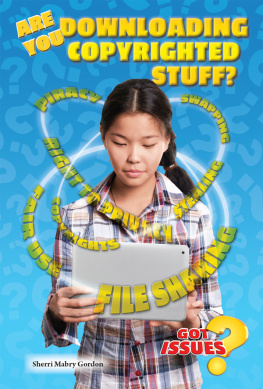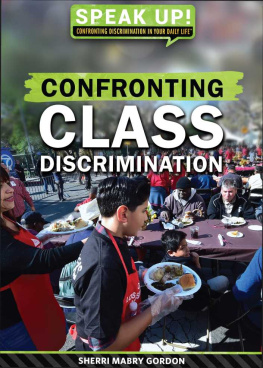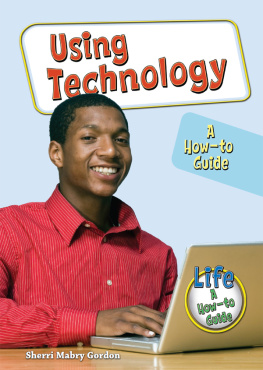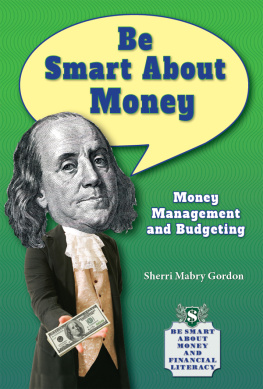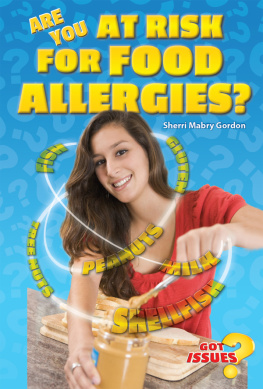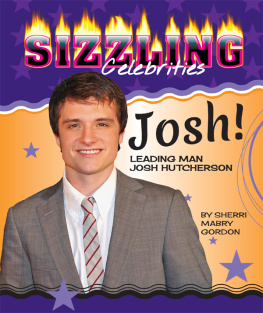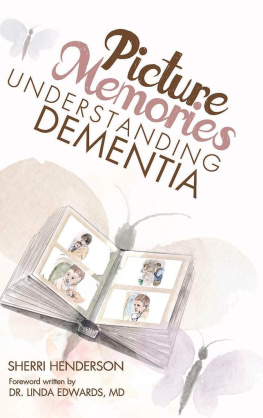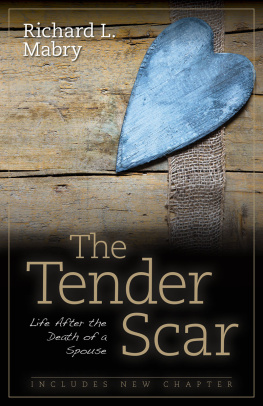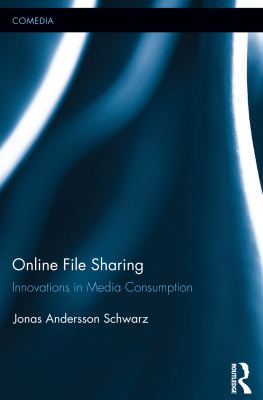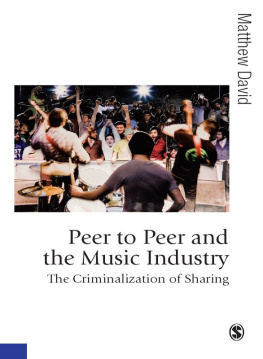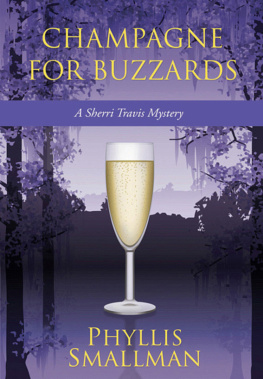Sherri Mabry Gordon - Are You Downloading Copyrighted Stuff?. Stealing or Fair Use
Here you can read online Sherri Mabry Gordon - Are You Downloading Copyrighted Stuff?. Stealing or Fair Use full text of the book (entire story) in english for free. Download pdf and epub, get meaning, cover and reviews about this ebook. year: 2014, publisher: Enslow Publishers, genre: Politics. Description of the work, (preface) as well as reviews are available. Best literature library LitArk.com created for fans of good reading and offers a wide selection of genres:
Romance novel
Science fiction
Adventure
Detective
Science
History
Home and family
Prose
Art
Politics
Computer
Non-fiction
Religion
Business
Children
Humor
Choose a favorite category and find really read worthwhile books. Enjoy immersion in the world of imagination, feel the emotions of the characters or learn something new for yourself, make an fascinating discovery.
- Book:Are You Downloading Copyrighted Stuff?. Stealing or Fair Use
- Author:
- Publisher:Enslow Publishers
- Genre:
- Year:2014
- Rating:3 / 5
- Favourites:Add to favourites
- Your mark:
- 60
- 1
- 2
- 3
- 4
- 5
Are You Downloading Copyrighted Stuff?. Stealing or Fair Use: summary, description and annotation
We offer to read an annotation, description, summary or preface (depends on what the author of the book "Are You Downloading Copyrighted Stuff?. Stealing or Fair Use" wrote himself). If you haven't found the necessary information about the book — write in the comments, we will try to find it.
Sherri Mabry Gordon: author's other books
Who wrote Are You Downloading Copyrighted Stuff?. Stealing or Fair Use? Find out the surname, the name of the author of the book and a list of all author's works by series.
Are You Downloading Copyrighted Stuff?. Stealing or Fair Use — read online for free the complete book (whole text) full work
Below is the text of the book, divided by pages. System saving the place of the last page read, allows you to conveniently read the book "Are You Downloading Copyrighted Stuff?. Stealing or Fair Use" online for free, without having to search again every time where you left off. Put a bookmark, and you can go to the page where you finished reading at any time.
Font size:
Interval:
Bookmark:
Millions of teenagers and adults download music from the Internet using a technology called peer-to-peer file sharing. With a few mouse clicks or taps on the screen, people can listen to their favorite songs without buying the album or tracks, and they can share them with their friends. Movies, games, and software can be shared as well. But most of this material is copyrighted, and downloading deprives the artists that created it. Find out what is legal and what is not!


Melody is a bright, energetic eighteen-year-old college student with an interest in architecture, a thirst for music, and a love of the Internet. Like most teenagers, Melody uses the Internet primarily for research and learning, keeping in touch with family members, chatting with friends, buying concert tickets, and playing online games.
Kids my age are truly the Internet Age, she says. Without the Internet, I dont think wed know what to do. We can find anything, do anything online with a matter of a few clicks.
Melody (not her real name) also uses the Internet to download music, movies, video clips, and software programs. Her collection is mostly music, about three thousand songs, and growing. Sharing music online is a particularly popular pastime for teenagers like Melody.
Using peer-to-peer file-sharing programs on the Internet, young people search for and download all kinds of music, including tunes by everyone from Adele and No Doubt to One Direction and the Dave Matthews Band. The options are endless.
This use of the Internet to download copyrighted material without paying for it is sometimes referred to as the underground Internet.
In July 2003, the Pew Internet and American Life Project reported that 29 percent of Internet users (about 35 million American adults) have downloaded music files to their computer so they can play them anytime they want. Whats more, 67 percent of those who do download music files say they do not care whether the files are copyrighted or not.
A copyright is a form of protection provided by the laws of the United States to the person or organization that created the material. Copyrighted material includes music, movies, books, software programs, computer games, photographs, newspaper and magazine articles, radio and television programs, and works of art.
The study found that Americans aged eighteen to twenty-nine are less likely to be concerned about copyright than any other age group, and that students are more likely to download music than non-students. Fifty-six percent of full-time students and 40 percent of part-time students report downloading music files.
[Downloading music is] more convenient and cheaperand thats important when youre in collegethan going out to the record store and spending twenty dollars on a CD when you may only want one or two songs off the CD, Melody says.
But the music industry does not view this type of file sharing as a harmless pastime. They claim to have lost millions of dollars due to online music swapping. As a result, there is a major debate over the legality of online file sharing.
Finding your favorite song online has become as easy as checking the weather or the latest sports scores, says Lee Rainie, director of the Pew Internet and American Life Project. Millions of Americans have joined the online music revolution in recent months. Its a huge threat to the music industry now and it is an [indication] of the trouble the Internet will pose to other entertainment forms like the movies.

Teens today can find anything, do anything online with a few clicks of the mouse or taps on the screen.
Peer-to-peer, or p2p, is technology that allows people to share files and information. The most popular information swapped through p2p technology is music, movies, and software. However, there is no limit to the types of information that can be shared.
In simple terms, peer-to-peer technology allows two or more devices, such as personal computers, to share files and information through the Internet. When using a peer-to-peer network, people can request information, offer information, or do both. The person who requests information is called a client, and the person who offers information is called a server. The person who acts as both a server and a client at the same time is called a servent (server + client).
Using p2p technology to share information and files became extremely popular in the late 1990s when a company called Napster began offering its music-swapping service. Soon it became one of the most widely used p2p applications on the Internet. (An application is any program designed to perform a specific function.) In February 2001, Napster said it had an average of 1.57 million simultaneous users per day until a court decision shut it down. Since then, numerous programs have popped up to try to fill the file-trading void. Some of these programs include LimeWire, which uses the Gnutella network, and Kazaa, which uses the FastTrack network.
Peer-to-peer technology is not a new idea, even though the general public did not begin using the technology until the 1990s. Sharing information through a network of computers was first done with computerized bulletin board systems (BBSs). The first BBS was a message-posting network that was created by Ward Christensen and Randy Seuss in the late 1970s.
A BBS worked a lot like a thumbtack bulletin boardexcept that it was computerized. After dialing in, people posted messages to a public board. Other people then read and responded to those messages. After an article explaining BBSs was published in 1978, many people and organizations began developing their own systems.
By the early 1990s most BBSs were connected to the Internet. There were more than sixty thousand BBSs in the United States alone. Then, as the World Wide Web became more popular, membership in BBSs began to decrease. Soon people were surfing the Web to get the information they needed.
While the original intent of BBSs and most other file-sharing methods was for good purposes, not all file sharing today is on the up-and-up or even legal. The vast majority of file sharing is in the form of online computer piracy. If something is pirated, it is copied without permission from the owner or copyright holder.
By law, only copyright owners can make copies or reproduce copyrighted material. Only they can give permission to others to copy the material or use it in another way. Making copies of copyrighted material without permission from the owner is against the law. Unfortunately, most of the files shared using peer-to-peer technology are copyrighted and should not be copied without permission.
Although there are many types of computer piracy, there are three main areas in which copyrights are violated online. These areas are music piracy, software piracy, and movie piracy.
Music is widely available online in a digital format called MP3 (short for MPEG-1 Layer 3). Using MP3 to pirate music is relatively new. MP3s allow people to compress music files without affecting the quality of the sound.
A file that is compressed is smaller in size and takes up less space on a CD. As a result, pirates can leave songs compressed and fit more than ten hours of music on a CD that will play through their computer. Whats more, devices similar to the Sony Walkman have been created that will play MP3 compressed files.
Font size:
Interval:
Bookmark:
Similar books «Are You Downloading Copyrighted Stuff?. Stealing or Fair Use»
Look at similar books to Are You Downloading Copyrighted Stuff?. Stealing or Fair Use. We have selected literature similar in name and meaning in the hope of providing readers with more options to find new, interesting, not yet read works.
Discussion, reviews of the book Are You Downloading Copyrighted Stuff?. Stealing or Fair Use and just readers' own opinions. Leave your comments, write what you think about the work, its meaning or the main characters. Specify what exactly you liked and what you didn't like, and why you think so.

